Jayne's Case: Mental Health, Alcohol Abuse & Effective Care Plan
VerifiedAdded on 2023/04/23
|8
|2234
|497
Essay
AI Summary
This essay assesses the case of Jayne, a 22-year-old student struggling with alcohol and drug misuse alongside mental health issues like depression, loneliness, and hallucinations. The essay explores various assessments needed for effective care planning, including urine analysis for urinary tract infections and substance use, psychiatric assessments for mental state and mood, and risk assessments for suicidal tendencies. It discusses interventions such as motivational interviewing and the health belief model, along with potential medications like selective serotonin reuptake inhibitors and anxiolytics. The importance of a multidisciplinary team approach, therapeutic relationships, and holistic nursing care is emphasized to promote Jayne's mental and physical well-being, with the ultimate goal of establishing a stable therapeutic relationship to facilitate her recovery.
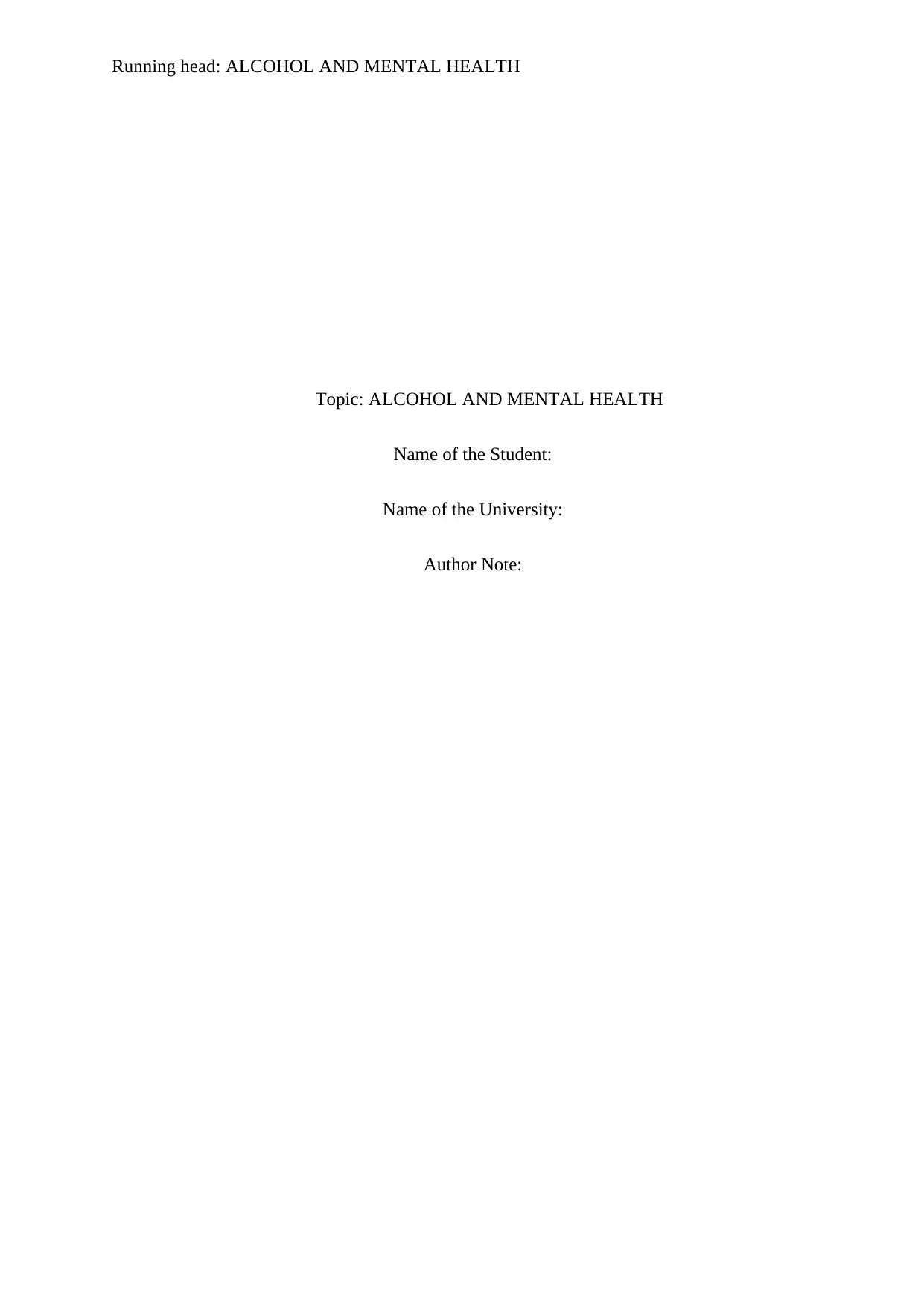
Running head: ALCOHOL AND MENTAL HEALTH
Topic: ALCOHOL AND MENTAL HEALTH
Name of the Student:
Name of the University:
Author Note:
Topic: ALCOHOL AND MENTAL HEALTH
Name of the Student:
Name of the University:
Author Note:
Paraphrase This Document
Need a fresh take? Get an instant paraphrase of this document with our AI Paraphraser
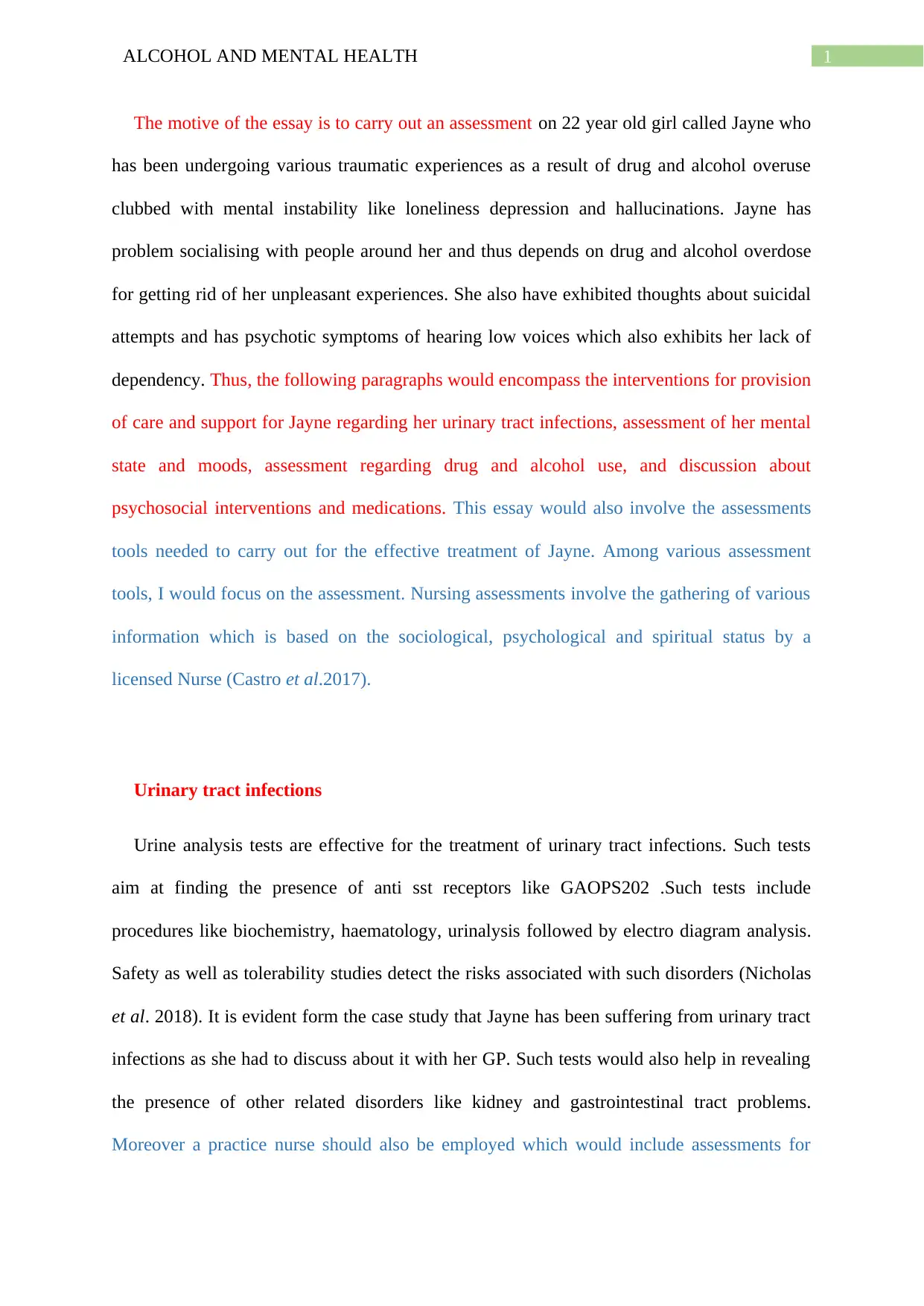
1ALCOHOL AND MENTAL HEALTH
The motive of the essay is to carry out an assessment on 22 year old girl called Jayne who
has been undergoing various traumatic experiences as a result of drug and alcohol overuse
clubbed with mental instability like loneliness depression and hallucinations. Jayne has
problem socialising with people around her and thus depends on drug and alcohol overdose
for getting rid of her unpleasant experiences. She also have exhibited thoughts about suicidal
attempts and has psychotic symptoms of hearing low voices which also exhibits her lack of
dependency. Thus, the following paragraphs would encompass the interventions for provision
of care and support for Jayne regarding her urinary tract infections, assessment of her mental
state and moods, assessment regarding drug and alcohol use, and discussion about
psychosocial interventions and medications. This essay would also involve the assessments
tools needed to carry out for the effective treatment of Jayne. Among various assessment
tools, I would focus on the assessment. Nursing assessments involve the gathering of various
information which is based on the sociological, psychological and spiritual status by a
licensed Nurse (Castro et al.2017).
Urinary tract infections
Urine analysis tests are effective for the treatment of urinary tract infections. Such tests
aim at finding the presence of anti sst receptors like GAOPS202 .Such tests include
procedures like biochemistry, haematology, urinalysis followed by electro diagram analysis.
Safety as well as tolerability studies detect the risks associated with such disorders (Nicholas
et al. 2018). It is evident form the case study that Jayne has been suffering from urinary tract
infections as she had to discuss about it with her GP. Such tests would also help in revealing
the presence of other related disorders like kidney and gastrointestinal tract problems.
Moreover a practice nurse should also be employed which would include assessments for
The motive of the essay is to carry out an assessment on 22 year old girl called Jayne who
has been undergoing various traumatic experiences as a result of drug and alcohol overuse
clubbed with mental instability like loneliness depression and hallucinations. Jayne has
problem socialising with people around her and thus depends on drug and alcohol overdose
for getting rid of her unpleasant experiences. She also have exhibited thoughts about suicidal
attempts and has psychotic symptoms of hearing low voices which also exhibits her lack of
dependency. Thus, the following paragraphs would encompass the interventions for provision
of care and support for Jayne regarding her urinary tract infections, assessment of her mental
state and moods, assessment regarding drug and alcohol use, and discussion about
psychosocial interventions and medications. This essay would also involve the assessments
tools needed to carry out for the effective treatment of Jayne. Among various assessment
tools, I would focus on the assessment. Nursing assessments involve the gathering of various
information which is based on the sociological, psychological and spiritual status by a
licensed Nurse (Castro et al.2017).
Urinary tract infections
Urine analysis tests are effective for the treatment of urinary tract infections. Such tests
aim at finding the presence of anti sst receptors like GAOPS202 .Such tests include
procedures like biochemistry, haematology, urinalysis followed by electro diagram analysis.
Safety as well as tolerability studies detect the risks associated with such disorders (Nicholas
et al. 2018). It is evident form the case study that Jayne has been suffering from urinary tract
infections as she had to discuss about it with her GP. Such tests would also help in revealing
the presence of other related disorders like kidney and gastrointestinal tract problems.
Moreover a practice nurse should also be employed which would include assessments for
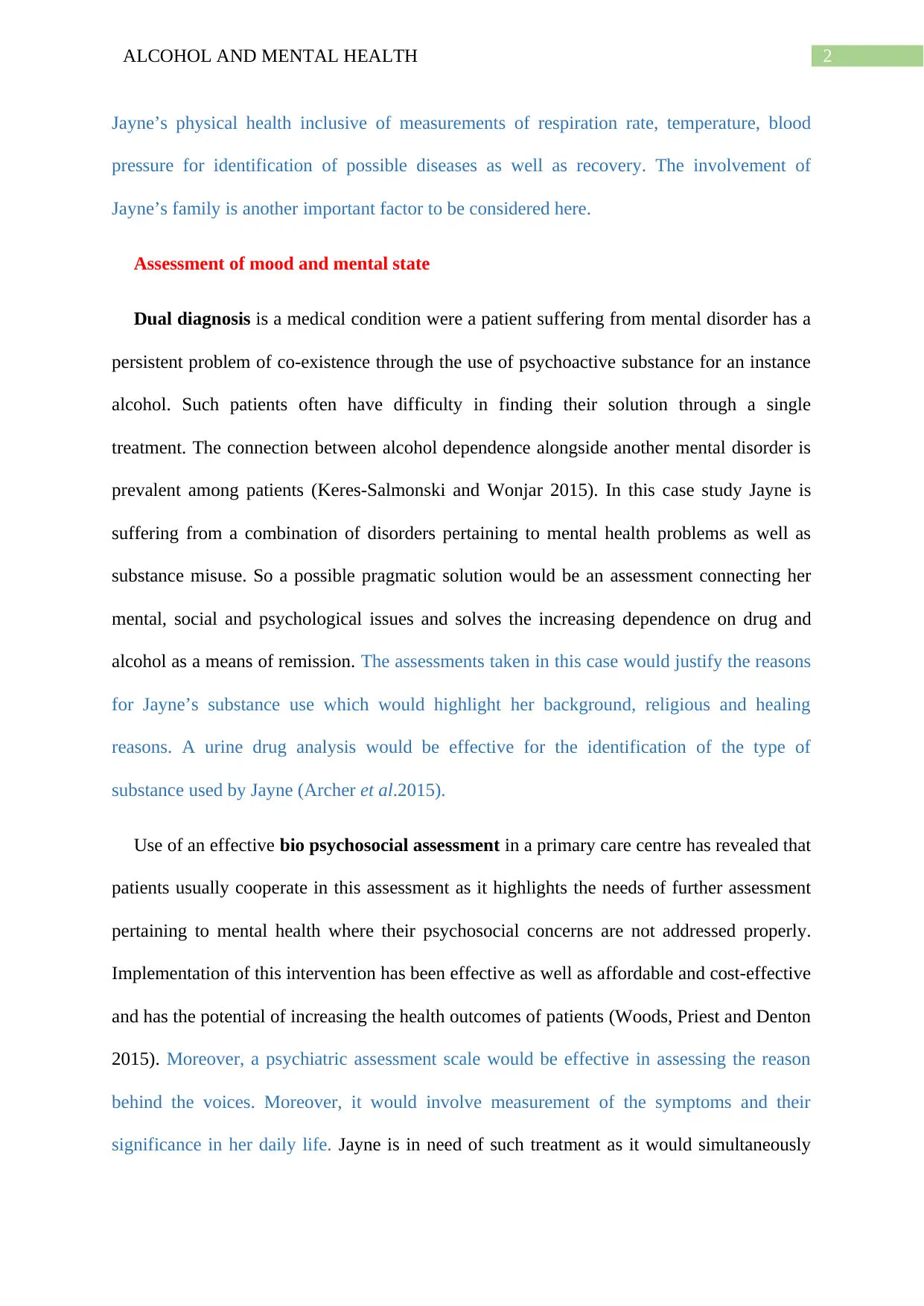
2ALCOHOL AND MENTAL HEALTH
Jayne’s physical health inclusive of measurements of respiration rate, temperature, blood
pressure for identification of possible diseases as well as recovery. The involvement of
Jayne’s family is another important factor to be considered here.
Assessment of mood and mental state
Dual diagnosis is a medical condition were a patient suffering from mental disorder has a
persistent problem of co-existence through the use of psychoactive substance for an instance
alcohol. Such patients often have difficulty in finding their solution through a single
treatment. The connection between alcohol dependence alongside another mental disorder is
prevalent among patients (Keres-Salmonski and Wonjar 2015). In this case study Jayne is
suffering from a combination of disorders pertaining to mental health problems as well as
substance misuse. So a possible pragmatic solution would be an assessment connecting her
mental, social and psychological issues and solves the increasing dependence on drug and
alcohol as a means of remission. The assessments taken in this case would justify the reasons
for Jayne’s substance use which would highlight her background, religious and healing
reasons. A urine drug analysis would be effective for the identification of the type of
substance used by Jayne (Archer et al.2015).
Use of an effective bio psychosocial assessment in a primary care centre has revealed that
patients usually cooperate in this assessment as it highlights the needs of further assessment
pertaining to mental health where their psychosocial concerns are not addressed properly.
Implementation of this intervention has been effective as well as affordable and cost-effective
and has the potential of increasing the health outcomes of patients (Woods, Priest and Denton
2015). Moreover, a psychiatric assessment scale would be effective in assessing the reason
behind the voices. Moreover, it would involve measurement of the symptoms and their
significance in her daily life. Jayne is in need of such treatment as it would simultaneously
Jayne’s physical health inclusive of measurements of respiration rate, temperature, blood
pressure for identification of possible diseases as well as recovery. The involvement of
Jayne’s family is another important factor to be considered here.
Assessment of mood and mental state
Dual diagnosis is a medical condition were a patient suffering from mental disorder has a
persistent problem of co-existence through the use of psychoactive substance for an instance
alcohol. Such patients often have difficulty in finding their solution through a single
treatment. The connection between alcohol dependence alongside another mental disorder is
prevalent among patients (Keres-Salmonski and Wonjar 2015). In this case study Jayne is
suffering from a combination of disorders pertaining to mental health problems as well as
substance misuse. So a possible pragmatic solution would be an assessment connecting her
mental, social and psychological issues and solves the increasing dependence on drug and
alcohol as a means of remission. The assessments taken in this case would justify the reasons
for Jayne’s substance use which would highlight her background, religious and healing
reasons. A urine drug analysis would be effective for the identification of the type of
substance used by Jayne (Archer et al.2015).
Use of an effective bio psychosocial assessment in a primary care centre has revealed that
patients usually cooperate in this assessment as it highlights the needs of further assessment
pertaining to mental health where their psychosocial concerns are not addressed properly.
Implementation of this intervention has been effective as well as affordable and cost-effective
and has the potential of increasing the health outcomes of patients (Woods, Priest and Denton
2015). Moreover, a psychiatric assessment scale would be effective in assessing the reason
behind the voices. Moreover, it would involve measurement of the symptoms and their
significance in her daily life. Jayne is in need of such treatment as it would simultaneously
⊘ This is a preview!⊘
Do you want full access?
Subscribe today to unlock all pages.

Trusted by 1+ million students worldwide
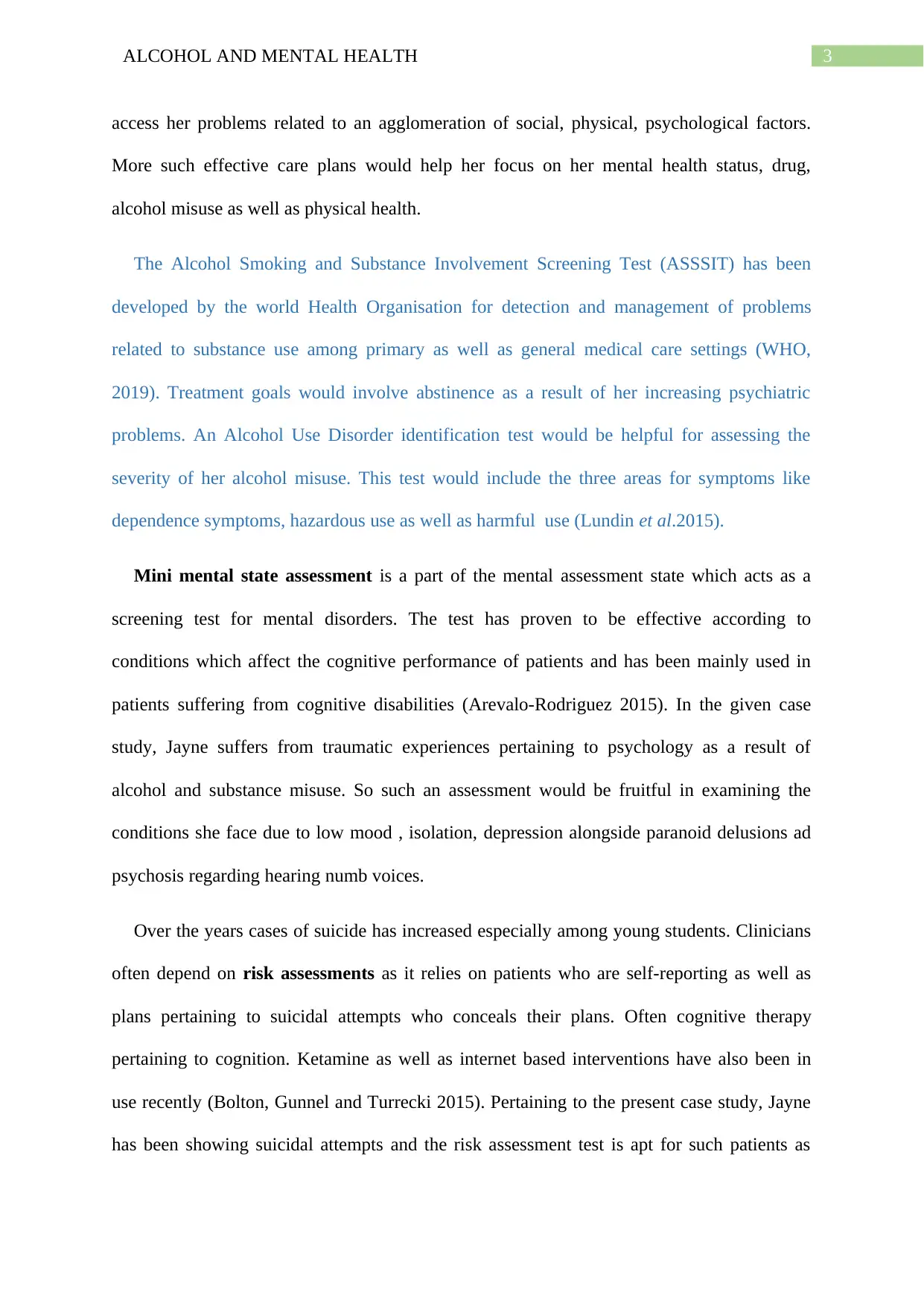
3ALCOHOL AND MENTAL HEALTH
access her problems related to an agglomeration of social, physical, psychological factors.
More such effective care plans would help her focus on her mental health status, drug,
alcohol misuse as well as physical health.
The Alcohol Smoking and Substance Involvement Screening Test (ASSSIT) has been
developed by the world Health Organisation for detection and management of problems
related to substance use among primary as well as general medical care settings (WHO,
2019). Treatment goals would involve abstinence as a result of her increasing psychiatric
problems. An Alcohol Use Disorder identification test would be helpful for assessing the
severity of her alcohol misuse. This test would include the three areas for symptoms like
dependence symptoms, hazardous use as well as harmful use (Lundin et al.2015).
Mini mental state assessment is a part of the mental assessment state which acts as a
screening test for mental disorders. The test has proven to be effective according to
conditions which affect the cognitive performance of patients and has been mainly used in
patients suffering from cognitive disabilities (Arevalo-Rodriguez 2015). In the given case
study, Jayne suffers from traumatic experiences pertaining to psychology as a result of
alcohol and substance misuse. So such an assessment would be fruitful in examining the
conditions she face due to low mood , isolation, depression alongside paranoid delusions ad
psychosis regarding hearing numb voices.
Over the years cases of suicide has increased especially among young students. Clinicians
often depend on risk assessments as it relies on patients who are self-reporting as well as
plans pertaining to suicidal attempts who conceals their plans. Often cognitive therapy
pertaining to cognition. Ketamine as well as internet based interventions have also been in
use recently (Bolton, Gunnel and Turrecki 2015). Pertaining to the present case study, Jayne
has been showing suicidal attempts and the risk assessment test is apt for such patients as
access her problems related to an agglomeration of social, physical, psychological factors.
More such effective care plans would help her focus on her mental health status, drug,
alcohol misuse as well as physical health.
The Alcohol Smoking and Substance Involvement Screening Test (ASSSIT) has been
developed by the world Health Organisation for detection and management of problems
related to substance use among primary as well as general medical care settings (WHO,
2019). Treatment goals would involve abstinence as a result of her increasing psychiatric
problems. An Alcohol Use Disorder identification test would be helpful for assessing the
severity of her alcohol misuse. This test would include the three areas for symptoms like
dependence symptoms, hazardous use as well as harmful use (Lundin et al.2015).
Mini mental state assessment is a part of the mental assessment state which acts as a
screening test for mental disorders. The test has proven to be effective according to
conditions which affect the cognitive performance of patients and has been mainly used in
patients suffering from cognitive disabilities (Arevalo-Rodriguez 2015). In the given case
study, Jayne suffers from traumatic experiences pertaining to psychology as a result of
alcohol and substance misuse. So such an assessment would be fruitful in examining the
conditions she face due to low mood , isolation, depression alongside paranoid delusions ad
psychosis regarding hearing numb voices.
Over the years cases of suicide has increased especially among young students. Clinicians
often depend on risk assessments as it relies on patients who are self-reporting as well as
plans pertaining to suicidal attempts who conceals their plans. Often cognitive therapy
pertaining to cognition. Ketamine as well as internet based interventions have also been in
use recently (Bolton, Gunnel and Turrecki 2015). Pertaining to the present case study, Jayne
has been showing suicidal attempts and the risk assessment test is apt for such patients as
Paraphrase This Document
Need a fresh take? Get an instant paraphrase of this document with our AI Paraphraser
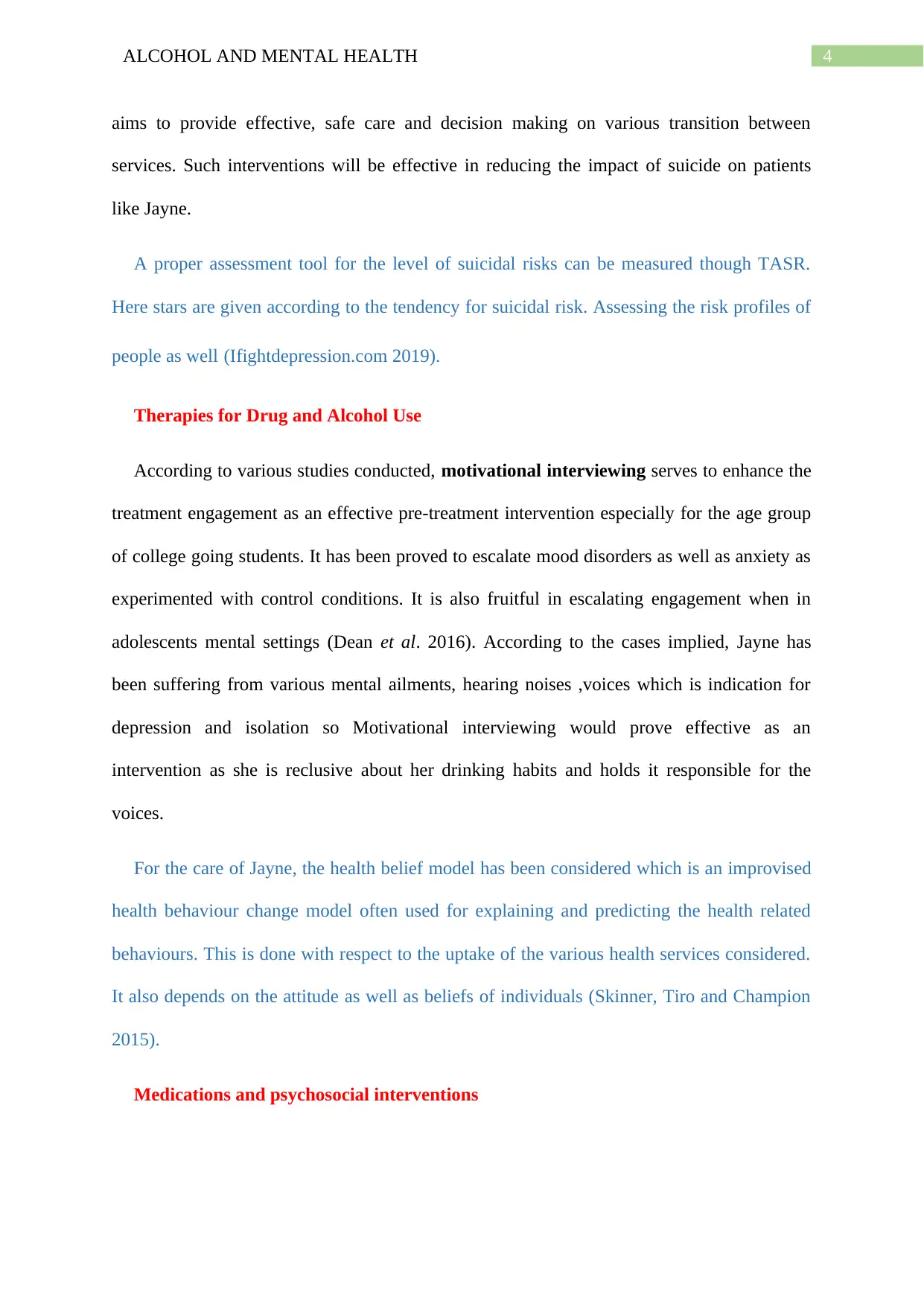
4ALCOHOL AND MENTAL HEALTH
aims to provide effective, safe care and decision making on various transition between
services. Such interventions will be effective in reducing the impact of suicide on patients
like Jayne.
A proper assessment tool for the level of suicidal risks can be measured though TASR.
Here stars are given according to the tendency for suicidal risk. Assessing the risk profiles of
people as well (Ifightdepression.com 2019).
Therapies for Drug and Alcohol Use
According to various studies conducted, motivational interviewing serves to enhance the
treatment engagement as an effective pre-treatment intervention especially for the age group
of college going students. It has been proved to escalate mood disorders as well as anxiety as
experimented with control conditions. It is also fruitful in escalating engagement when in
adolescents mental settings (Dean et al. 2016). According to the cases implied, Jayne has
been suffering from various mental ailments, hearing noises ,voices which is indication for
depression and isolation so Motivational interviewing would prove effective as an
intervention as she is reclusive about her drinking habits and holds it responsible for the
voices.
For the care of Jayne, the health belief model has been considered which is an improvised
health behaviour change model often used for explaining and predicting the health related
behaviours. This is done with respect to the uptake of the various health services considered.
It also depends on the attitude as well as beliefs of individuals (Skinner, Tiro and Champion
2015).
Medications and psychosocial interventions
aims to provide effective, safe care and decision making on various transition between
services. Such interventions will be effective in reducing the impact of suicide on patients
like Jayne.
A proper assessment tool for the level of suicidal risks can be measured though TASR.
Here stars are given according to the tendency for suicidal risk. Assessing the risk profiles of
people as well (Ifightdepression.com 2019).
Therapies for Drug and Alcohol Use
According to various studies conducted, motivational interviewing serves to enhance the
treatment engagement as an effective pre-treatment intervention especially for the age group
of college going students. It has been proved to escalate mood disorders as well as anxiety as
experimented with control conditions. It is also fruitful in escalating engagement when in
adolescents mental settings (Dean et al. 2016). According to the cases implied, Jayne has
been suffering from various mental ailments, hearing noises ,voices which is indication for
depression and isolation so Motivational interviewing would prove effective as an
intervention as she is reclusive about her drinking habits and holds it responsible for the
voices.
For the care of Jayne, the health belief model has been considered which is an improvised
health behaviour change model often used for explaining and predicting the health related
behaviours. This is done with respect to the uptake of the various health services considered.
It also depends on the attitude as well as beliefs of individuals (Skinner, Tiro and Champion
2015).
Medications and psychosocial interventions
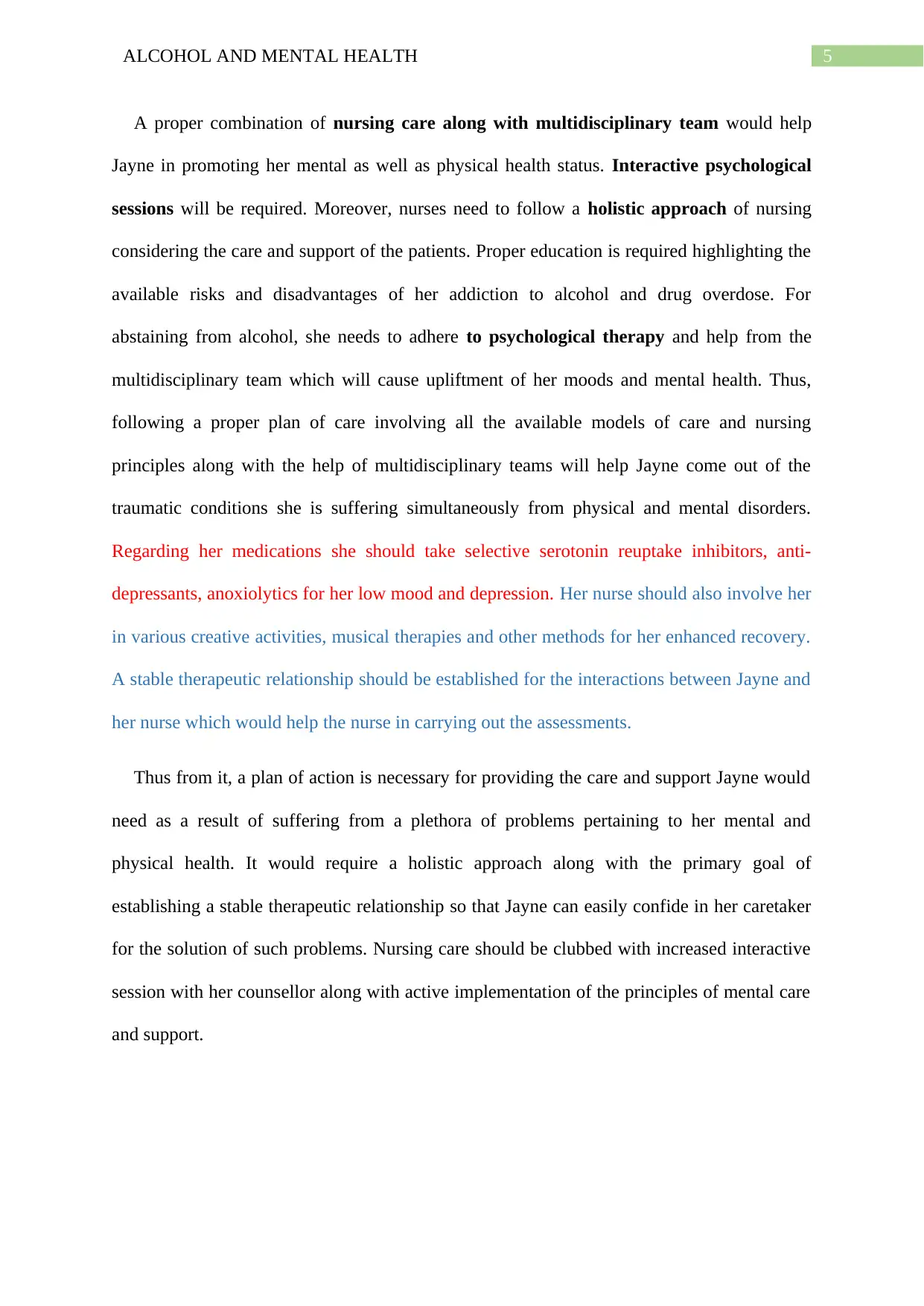
5ALCOHOL AND MENTAL HEALTH
A proper combination of nursing care along with multidisciplinary team would help
Jayne in promoting her mental as well as physical health status. Interactive psychological
sessions will be required. Moreover, nurses need to follow a holistic approach of nursing
considering the care and support of the patients. Proper education is required highlighting the
available risks and disadvantages of her addiction to alcohol and drug overdose. For
abstaining from alcohol, she needs to adhere to psychological therapy and help from the
multidisciplinary team which will cause upliftment of her moods and mental health. Thus,
following a proper plan of care involving all the available models of care and nursing
principles along with the help of multidisciplinary teams will help Jayne come out of the
traumatic conditions she is suffering simultaneously from physical and mental disorders.
Regarding her medications she should take selective serotonin reuptake inhibitors, anti-
depressants, anoxiolytics for her low mood and depression. Her nurse should also involve her
in various creative activities, musical therapies and other methods for her enhanced recovery.
A stable therapeutic relationship should be established for the interactions between Jayne and
her nurse which would help the nurse in carrying out the assessments.
Thus from it, a plan of action is necessary for providing the care and support Jayne would
need as a result of suffering from a plethora of problems pertaining to her mental and
physical health. It would require a holistic approach along with the primary goal of
establishing a stable therapeutic relationship so that Jayne can easily confide in her caretaker
for the solution of such problems. Nursing care should be clubbed with increased interactive
session with her counsellor along with active implementation of the principles of mental care
and support.
A proper combination of nursing care along with multidisciplinary team would help
Jayne in promoting her mental as well as physical health status. Interactive psychological
sessions will be required. Moreover, nurses need to follow a holistic approach of nursing
considering the care and support of the patients. Proper education is required highlighting the
available risks and disadvantages of her addiction to alcohol and drug overdose. For
abstaining from alcohol, she needs to adhere to psychological therapy and help from the
multidisciplinary team which will cause upliftment of her moods and mental health. Thus,
following a proper plan of care involving all the available models of care and nursing
principles along with the help of multidisciplinary teams will help Jayne come out of the
traumatic conditions she is suffering simultaneously from physical and mental disorders.
Regarding her medications she should take selective serotonin reuptake inhibitors, anti-
depressants, anoxiolytics for her low mood and depression. Her nurse should also involve her
in various creative activities, musical therapies and other methods for her enhanced recovery.
A stable therapeutic relationship should be established for the interactions between Jayne and
her nurse which would help the nurse in carrying out the assessments.
Thus from it, a plan of action is necessary for providing the care and support Jayne would
need as a result of suffering from a plethora of problems pertaining to her mental and
physical health. It would require a holistic approach along with the primary goal of
establishing a stable therapeutic relationship so that Jayne can easily confide in her caretaker
for the solution of such problems. Nursing care should be clubbed with increased interactive
session with her counsellor along with active implementation of the principles of mental care
and support.
⊘ This is a preview!⊘
Do you want full access?
Subscribe today to unlock all pages.

Trusted by 1+ million students worldwide
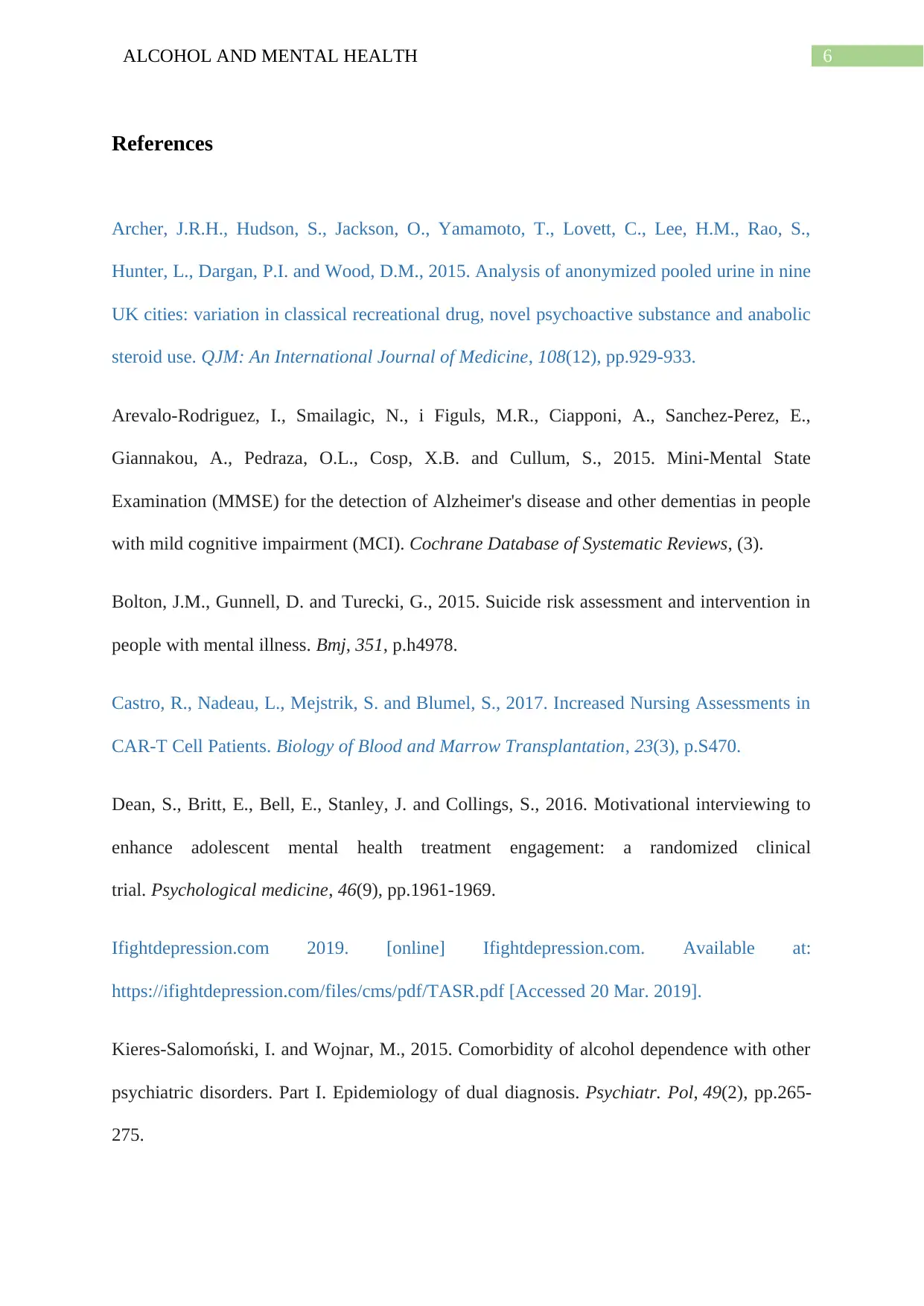
6ALCOHOL AND MENTAL HEALTH
References
Archer, J.R.H., Hudson, S., Jackson, O., Yamamoto, T., Lovett, C., Lee, H.M., Rao, S.,
Hunter, L., Dargan, P.I. and Wood, D.M., 2015. Analysis of anonymized pooled urine in nine
UK cities: variation in classical recreational drug, novel psychoactive substance and anabolic
steroid use. QJM: An International Journal of Medicine, 108(12), pp.929-933.
Arevalo‐Rodriguez, I., Smailagic, N., i Figuls, M.R., Ciapponi, A., Sanchez‐Perez, E.,
Giannakou, A., Pedraza, O.L., Cosp, X.B. and Cullum, S., 2015. Mini‐Mental State
Examination (MMSE) for the detection of Alzheimer's disease and other dementias in people
with mild cognitive impairment (MCI). Cochrane Database of Systematic Reviews, (3).
Bolton, J.M., Gunnell, D. and Turecki, G., 2015. Suicide risk assessment and intervention in
people with mental illness. Bmj, 351, p.h4978.
Castro, R., Nadeau, L., Mejstrik, S. and Blumel, S., 2017. Increased Nursing Assessments in
CAR-T Cell Patients. Biology of Blood and Marrow Transplantation, 23(3), p.S470.
Dean, S., Britt, E., Bell, E., Stanley, J. and Collings, S., 2016. Motivational interviewing to
enhance adolescent mental health treatment engagement: a randomized clinical
trial. Psychological medicine, 46(9), pp.1961-1969.
Ifightdepression.com 2019. [online] Ifightdepression.com. Available at:
https://ifightdepression.com/files/cms/pdf/TASR.pdf [Accessed 20 Mar. 2019].
Kieres-Salomoński, I. and Wojnar, M., 2015. Comorbidity of alcohol dependence with other
psychiatric disorders. Part I. Epidemiology of dual diagnosis. Psychiatr. Pol, 49(2), pp.265-
275.
References
Archer, J.R.H., Hudson, S., Jackson, O., Yamamoto, T., Lovett, C., Lee, H.M., Rao, S.,
Hunter, L., Dargan, P.I. and Wood, D.M., 2015. Analysis of anonymized pooled urine in nine
UK cities: variation in classical recreational drug, novel psychoactive substance and anabolic
steroid use. QJM: An International Journal of Medicine, 108(12), pp.929-933.
Arevalo‐Rodriguez, I., Smailagic, N., i Figuls, M.R., Ciapponi, A., Sanchez‐Perez, E.,
Giannakou, A., Pedraza, O.L., Cosp, X.B. and Cullum, S., 2015. Mini‐Mental State
Examination (MMSE) for the detection of Alzheimer's disease and other dementias in people
with mild cognitive impairment (MCI). Cochrane Database of Systematic Reviews, (3).
Bolton, J.M., Gunnell, D. and Turecki, G., 2015. Suicide risk assessment and intervention in
people with mental illness. Bmj, 351, p.h4978.
Castro, R., Nadeau, L., Mejstrik, S. and Blumel, S., 2017. Increased Nursing Assessments in
CAR-T Cell Patients. Biology of Blood and Marrow Transplantation, 23(3), p.S470.
Dean, S., Britt, E., Bell, E., Stanley, J. and Collings, S., 2016. Motivational interviewing to
enhance adolescent mental health treatment engagement: a randomized clinical
trial. Psychological medicine, 46(9), pp.1961-1969.
Ifightdepression.com 2019. [online] Ifightdepression.com. Available at:
https://ifightdepression.com/files/cms/pdf/TASR.pdf [Accessed 20 Mar. 2019].
Kieres-Salomoński, I. and Wojnar, M., 2015. Comorbidity of alcohol dependence with other
psychiatric disorders. Part I. Epidemiology of dual diagnosis. Psychiatr. Pol, 49(2), pp.265-
275.
Paraphrase This Document
Need a fresh take? Get an instant paraphrase of this document with our AI Paraphraser
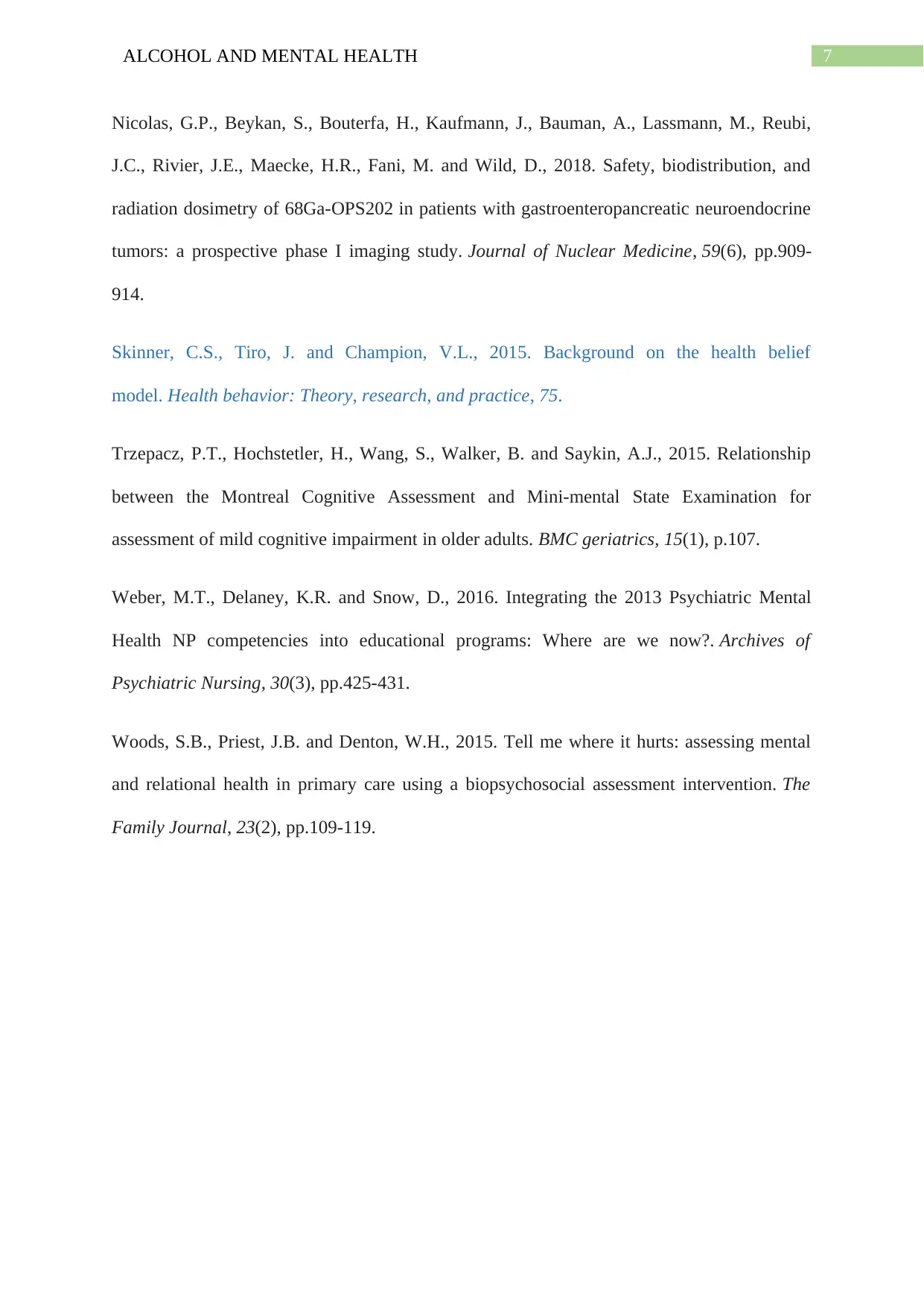
7ALCOHOL AND MENTAL HEALTH
Nicolas, G.P., Beykan, S., Bouterfa, H., Kaufmann, J., Bauman, A., Lassmann, M., Reubi,
J.C., Rivier, J.E., Maecke, H.R., Fani, M. and Wild, D., 2018. Safety, biodistribution, and
radiation dosimetry of 68Ga-OPS202 in patients with gastroenteropancreatic neuroendocrine
tumors: a prospective phase I imaging study. Journal of Nuclear Medicine, 59(6), pp.909-
914.
Skinner, C.S., Tiro, J. and Champion, V.L., 2015. Background on the health belief
model. Health behavior: Theory, research, and practice, 75.
Trzepacz, P.T., Hochstetler, H., Wang, S., Walker, B. and Saykin, A.J., 2015. Relationship
between the Montreal Cognitive Assessment and Mini-mental State Examination for
assessment of mild cognitive impairment in older adults. BMC geriatrics, 15(1), p.107.
Weber, M.T., Delaney, K.R. and Snow, D., 2016. Integrating the 2013 Psychiatric Mental
Health NP competencies into educational programs: Where are we now?. Archives of
Psychiatric Nursing, 30(3), pp.425-431.
Woods, S.B., Priest, J.B. and Denton, W.H., 2015. Tell me where it hurts: assessing mental
and relational health in primary care using a biopsychosocial assessment intervention. The
Family Journal, 23(2), pp.109-119.
Nicolas, G.P., Beykan, S., Bouterfa, H., Kaufmann, J., Bauman, A., Lassmann, M., Reubi,
J.C., Rivier, J.E., Maecke, H.R., Fani, M. and Wild, D., 2018. Safety, biodistribution, and
radiation dosimetry of 68Ga-OPS202 in patients with gastroenteropancreatic neuroendocrine
tumors: a prospective phase I imaging study. Journal of Nuclear Medicine, 59(6), pp.909-
914.
Skinner, C.S., Tiro, J. and Champion, V.L., 2015. Background on the health belief
model. Health behavior: Theory, research, and practice, 75.
Trzepacz, P.T., Hochstetler, H., Wang, S., Walker, B. and Saykin, A.J., 2015. Relationship
between the Montreal Cognitive Assessment and Mini-mental State Examination for
assessment of mild cognitive impairment in older adults. BMC geriatrics, 15(1), p.107.
Weber, M.T., Delaney, K.R. and Snow, D., 2016. Integrating the 2013 Psychiatric Mental
Health NP competencies into educational programs: Where are we now?. Archives of
Psychiatric Nursing, 30(3), pp.425-431.
Woods, S.B., Priest, J.B. and Denton, W.H., 2015. Tell me where it hurts: assessing mental
and relational health in primary care using a biopsychosocial assessment intervention. The
Family Journal, 23(2), pp.109-119.
1 out of 8
Related Documents
Your All-in-One AI-Powered Toolkit for Academic Success.
+13062052269
info@desklib.com
Available 24*7 on WhatsApp / Email
![[object Object]](/_next/static/media/star-bottom.7253800d.svg)
Unlock your academic potential
Copyright © 2020–2026 A2Z Services. All Rights Reserved. Developed and managed by ZUCOL.





